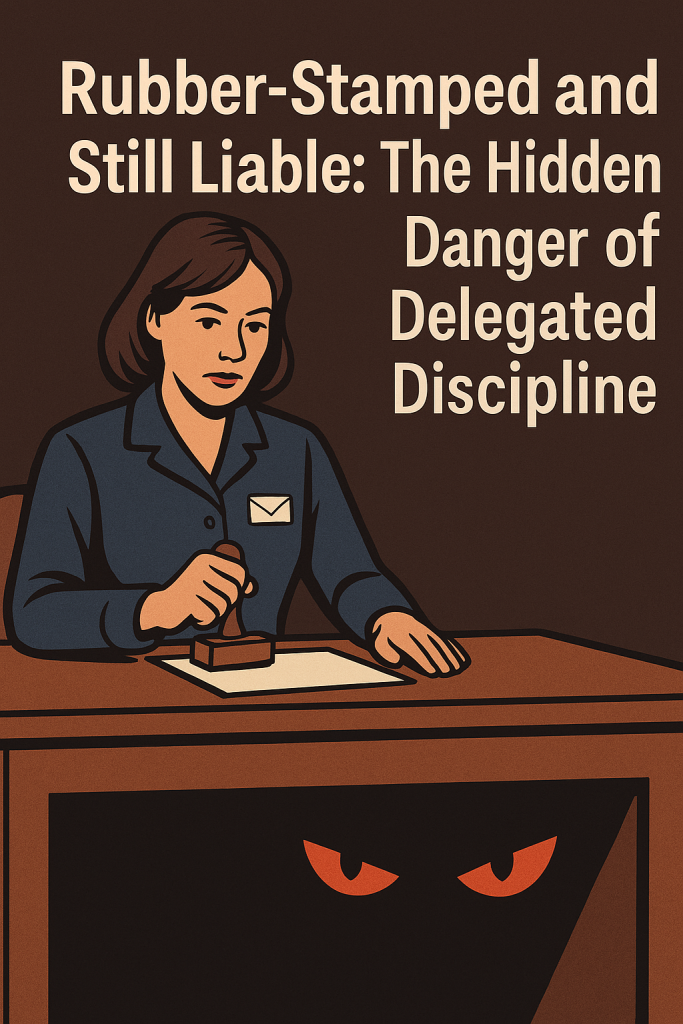Search
Rubber-Stamped and Still Liable: The Hidden Danger of Delegated Discipline

Some employers think they’ve found a silver bullet: delegate the tough call to someone else and—boom—problem solved, liability dodged. But as the Ninth Circuit recently reminded us, an “independent” reviewer isn’t a shield if they’re just channeling someone else’s bias.
TL;DR: The Ninth Circuit reinstated a discrimination claim after finding that an “independent” reviewer may have simply rubber-stamped a biased demotion recommendation. The court emphasized that even without overt bias, relying blindly on tainted input—especially after warnings about racial animus—can expose an employer to liability. A jury will now decide whether the so-called neutral decision was just a cleanup job for someone else’s discrimination.
From Postmaster to Pariah: The Allegations of Bias
The case involved a longtime USPS employee—an Asian-American woman in her fifties—who had served as a Postmaster for years. After being assigned to lead a new location, she allegedly became the target of a campaign of hostility. According to her and her then-supervisor, the hostility came in the form of false complaints and discriminatory comments from employees at the new post office.
Coworkers allegedly called her “Asian b*tch” and “witch,” spread rumors that she couldn’t speak or read English, and questioned whether she had an inappropriate relationship with her (Asian-American) supervisor. In her declaration, the employee described being subjected to a “humiliating interview” during one internal investigation, in which she was asked whether she had a personal or intimate relationship with her supervisor. She believed the question stemmed from racial and gender-based assumptions—particularly since her supervisor was married to an Asian woman.
That supervisor raised concerns about racial bias with HR—but claimed HR ignored those concerns and instead aligned with a union rep to build a case against her.
The Paper Trail to Demotion—and the Rubber Stamp That Followed
Eventually, HR and labor relations officials drafted a proposed demotion, citing three instances of “unacceptable conduct.” When the supervisor refused to sign the notice—calling it baseless and racially motivated—he was removed from the process. Another USPS manager signed off instead.
When the employee appealed internally, a new official, purportedly neutral, reviewed the case and upheld the demotion. USPS argued this broke the causal chain. The district court agreed. But the Ninth Circuit wasn’t convinced.
That official never interviewed witnesses, relied entirely on secondhand reports, and ignored warnings that racial bias may have influenced the original allegations. According to the court, a jury could reasonably find that this wasn’t a truly independent decision.
The court’s analysis draws heavily on the “cat’s paw” theory of liability—where a biased subordinate manipulates a decision-maker into taking adverse action against an employee. Even if the final decision-maker harbors no discriminatory animus, the employer can still be liable if that person acts as the conduit for someone else’s bias. Here, the reviewing official accepted the disciplinary recommendation without questioning the credibility of the sources or considering whether discriminatory motives may have tainted the process. That failure to exercise independent judgment left the door wide open for the bias to infect the outcome.
This wasn’t an abstract procedural misstep. The employee’s immediate supervisor had flagged the underlying complaints as racially motivated—and was sidelined when he refused to go along with the discipline. In the court’s view, those facts were enough to let a jury decide whether the employer merely cleaned up a biased demotion with a neutral signature.
 Three Key Takeaways for Employers and HR:
Three Key Takeaways for Employers and HR:
- Bias can travel up the chain.
If a final decision is based on reports from people with discriminatory motives, the employer may still be on the hook—even if the decision-maker appears neutral on paper. - So beware of cat’s paw liability.
Even if a final decision-maker is neutral, employers can still be held liable when that person unknowingly carries out a biased subordinate’s agenda. Rubber-stamping recommendations without scrutiny invites exactly this kind of exposure. - Independent means investigative.
A truly independent decision-maker needs to ask questions, seek context, and evaluate credibility—not just rubber-stamp paperwork from people accused of bias.
The Bottom Line
Delegating decisions doesn’t shield your organization from liability if the facts suggest the outcome was influenced by discrimination. If you want “independent” to mean something in court, make sure it means something in practice. That means doing the work, not just signing the paperwork.
 The Employer Handbook Blog
The Employer Handbook Blog


